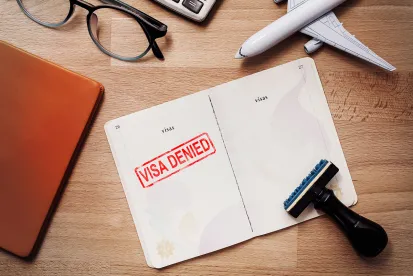On Monday, June 22, 2020, President Trump signed a Presidential Proclamation restricting the entry of certain nonimmigrants into the United States and extending the prior restriction on the entry of new immigrant visa holders. The Proclamation indicated that the new restriction would apply only to H-1B, H-2B, L-1 and certain J-1 travelers who were outside the United States, and not in possession of a valid visa or travel document as of the effective date of June 24, 2020. For details, please see our prior alert.
The Proclamation left some critical questions unanswered regarding its implementation. The government has since issued clarification addressing several of these issues; other open issues remain outstanding.
Resolved Issues Since the Release of the Proclamation
Canadians Exempt from Nonimmigrant Entry Ban
U.S. Customs and Border Protection (CBP) Headquarters has confirmed that visa-exempt Canadians are not subject to the suspension of admission to the United States. Canadians entering the U.S. in most nonimmigrant categories are visa exempt, and only need to present the requisite documents or approvals at the Port of Entry when seeking admission to the U.S. In most instances, they are not required to obtain a nonimmigrant visa at a U.S. Embassy or Consulate prior to entering the United States. Because Canadians do not need visas, they generally do not have visas valid on the effective date of the Presidential Proclamation. This raised the question of whether they would be barred entry in H-1B, H-2B, L-1 or J-1 classification. CBP Headquarters has confirmed that these Canadians are not affected and may continue to enter the U.S. in these classifications.
There is no indication that Canadians will be similarly exempt from the immigrant visa ban that was issued on April 22 and extended by the June 22 Proclamation through the end of the year.
Prior Entry Not Required
The Proclamation indicates that individuals outside the U.S. and without H, L and J visas that are valid on the June 24 effective date would be barred from entering the U.S. The Proclamation suggested – and the U.S. Citizenship and Immigration Services (USCIS) has now confirmed – that prior entry on that valid visa is not required to be exempt from the entry ban. Those with H, L, and J visas issued prior to and valid on June 24 will be permitted to enter the United States even if they have not previously entered the U.S. on those visas.
This confirmation is welcome news and confirms our interpretation of the Proclamation – that only those who are both outside the U.S. and not in possession of a valid visa are affected.
Lawfully Present in the United States – Valid Visa Not Required
The USCIS announcement suggests that individuals inside the U.S., but not in possession of a valid visa, are also exempt from the ban, and should be able to return to the U.S. following travel abroad. This would be consistent with the text of the Proclamation, but until this is specifically confirmed, international travel poses a risk. Of course, U.S. Embassies and Consulates remain closed for routine visa processing, effectively limiting this travel for the time being.
USCIS Processing of Petitions and Applications Is Unchanged
Petitions and applications filed with USCIS continue to be processed and are not affected by the June 22 Proclamation. This includes petitions filed for extensions of nonimmigrant status and petitions for change of status to H, L and J classification. Similarly, the immigrant visa entry ban applies only to new permanent residents entering the U.S. with immigrant visas issued abroad. Adjustment of Status applications for permanent residence filed by applicants in the U.S. are unaffected and continue to be processed, as do the underlying immigrant visa petitions.
Unresolved Issues
The Meaning of a “Valid Nonimmigrant Visa”
The Proclamation states that an individual with a “visa that is valid on the effective date of this proclamation” is exempt from the travel ban. A plain reading of the Proclamation indicates that an individual with an unexpired U.S. visa in any visa classification is exempt from the ban.
However, it is not known at this time if the person would need to return to the U.S. with the same visa, or a new visa in the same visa classification, in order to be exempt from the travel ban. For example, an F-1 student who departed the U.S. prior to June 24 with a visa that is valid on June 24, may be planning to reenter the U.S. on an H-1B visa. Similarly, an H-1B worker may have departed the U.S. prior to June 24 with an unexpired visa, and needs to apply for a new H-1B visa stamp prior to returning to the U.S. It appears that under these fact patterns, the person is exempt from the travel ban, but that is unconfirmed at this time.
Automatic Visa Revalidation
Another area where the impact of the Proclamation remains unclear is automatic visa revalidation.
Individuals in the U.S. with an unexpired period of admission may travel to Canada or Mexico for a period of up to 30 days and return to the U.S. without presenting a valid visa, pursuant to a rule known as “automatic visa revalidation.” By regulation, under certain conditions, the validity of an expired visa is automatically extended to the date of application for readmission. In cases where the individual has changed status to a different classification in the U.S., the rule both extends the validity of the visa to the date of application for readmission and also converts the visa to the new classification.
If someone in the U.S. in H, L, or J nonimmigrant status traveled to Canada or Mexico prior to June 24 without a valid visa, it is unclear whether the Proclamation bars the individual’s return to the U.S. It may be the case that the automatic visa revalidation regulation exempts these individuals from the Proclamation, instead treating them as having a valid visa as of the effective date of the Proclamation. This important issue awaits clarification.
Impact of the Travel Ban on Dependent Spouses and Children
The Proclamation states that the travel ban applies to individuals seeking entry to the U.S. in one of the stated visa classes, “and any alien accompanying or following to join such alien.” This references dependent spouses and children who are eligible for dependent visas.
One scenario that has arisen is when the principal visa holder (H-1B, H-2B, J-1, L-1) is in the U.S. in valid status, but has dependent family members who are outside the U.S. without a valid visa. The Proclamation is unclear as to whether the travel ban applies to the dependent family members. This family unification issue also is in need of clarification.
This promises to be a rapidly evolving situation and we will provide updates as new information becomes available.





 />i
/>i
